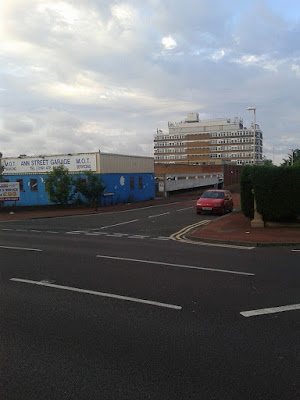DieHard Gateshead
Written by Ruth Raynor; Directed by Neil Armstrong
Caedmon’s Hall, Gateshead Library
Thursday 16th July 2015
TOM MAY
It wasn’t quite Byker
Grove meets Brecht, but while that is a pleasing notion for the noggin,
this was tangibly necessary: a humane, subtle drama about austerity
and its impact on community. Not placard-waving, confrontational agit-prop but
a demonstration of what our people are like; this is who you are trying to do
down and what you are trying to take away, Mr Osborne.
There is a place for political theatre, and the time is surely
now. We’re faced with an arrogant government, on a low-turnout 37% vote-share ‘mandate’,
that looks to further curb trade unionism, cut back legal aid, turn education
into solely a financial transaction, close libraries and open up the countryside
to the moot practice of fracking. An administration that is seriously considering
making people save up for their own sick pay.
Raynor has spoken of being inspired by the writing of the
likes of Alan Plater and Tom Hadaway; the influence shows; something of the
jovial, egalitarian spirit of Plater is transposed to the inexorable treadmill of austerity Britain in 2015. She sets the piece in a Gateshead Community Centre,
which has just about kept going through already harsh financial ‘economies’ in
previous years.
The Gateshead parliamentary seat has the 92nd
highest unemployment rate in Britain (5.9%) and the 26th highest
seat with constituents who are in very bad health: 2.07% 34.45% live in social
housing – also 26th highest out of 600+ constituencies. 30.47% of
people have no qualifications. 22.55% of people hold no passport. While UKIP
did well here in the last General Election, finishing second with 17.8% of the
vote, this was considerably less well than in Tory seats in Essex and Kent or
coastal north east constituencies such as Blyth Valley and Hartlepool. Only
just over one in ten of the 'Heed' electorate voted UKIP. This play does not engage in
the media habit of assuming that this vocal minority therefore demonstrates that
the people of Gateshead have a resentful, insular mind-set.
Raynor has commented that her play ‘was built with the
kindness of a Tyneside women’s group. Participants took part in a range of
workshops and interviews and gave feedback on two drafts of the script. Because
of cuts and changes to the terms of funding the group is no longer running.’
There is a complex dissolving of hierarchies within the Centre's women’s group, which is not homogeneously this or that (working-class,
middle-class, underclass), but is carefully pitched and realistic to the locale.
The older community centre worker Lesley, with her beliefs in Noel Edmonds –
false-consciousness subtly and funnily highlighted – and the feint but
palpable class memory coming out in Sandra when she talks about the ‘New’
Jarrow March and its Facebook group. The strong women of this play - chiefly Lesley and Sandra - mirror Heather Wood of Easington Action Group, who I saw speak forcefully and
eloquently of practical community campaigning at the recent Durham Moot event.
Lesley (Judi Earl) is the convenor of the group, unpretentious and grounded, yet with odd ideas about self-help. Katie
(Christina Berriman Dawson) is morose, glowering and reluctant mother of six,
but who grows into the action and with the group. Sandra (Jessica Johnson) is
the most forthright and belligerent, with a rough way with words, and who is incredibly
articulate. Julia (Arabella Arnott) seems like she'll be an overly stereotypical materialistic middle-class lass, but isn't quite so clear-cut. Rosie (Zoe Lambert) is the theatre project leader, idealistic and
driven, if less worldly than she might think. The cast is uniformly excellent, able to veer seamlessly between gags and pathos.
The play mixes and contrasts high and low cultural
references – the ancient Greek Orpheus myth with Die Hard and Crinkly Bottom. This is necessary to take the audience with
the action, and weave in the political ideas. What does this say to me about my
life? You feel that Raynor is pondering and addressing this question for a wide
range of local audiences – the play was also staged at Newcastle’s Alphabetti
and the Washington Arts Centre. Music is shrewdly used: from a looped intro
from recent-ish pop that I cannot place, to two Crowded House tracks, including
the apt melancholy of ‘Don’t Dream It’s Over’ to close.
She also astutely
includes a mixed lexical register of “shite”, “asset management” and “wifey”
and the ace wordplay of “Start Arts”. As well as posing the comical
interrogative: ‘Remember Blobbyland?’ There is some sense of language being
contested, while the financial parameters are set from Westminster.
Ruth Raynor’s play is more Mhairi Black than Liz Kendall. It
is controlled, funny and tender and yes, it is angry. There is class
consciousness and compassion for disparate people. We need this sort of thing
on telly, and a better BBC to produce many new and proudly low-budget single
plays in place of high-cost adaptations and costume serials.
In post-Chavs era,
we should have seen the back of grotesquely stereotypical representations of
the working or under-classes. I don’t think we have. Nor does Raynor, who knows
that current snobbery is the path to decay; she doesn’t just see the best in
people, but sees that drawing lazy or prejudicial distinctions is not the way to
live your life. The play carefully displays human differences and foibles,
but implies that only in acting together – metaphorically and literally – can we
laugh and connect, or indeed achieve anything of lasting worth.






